If you’re new to Ego Development Theory, start here: An Introduction to “Ego Development Theory” by Susanne Cook-Greuter (EDT Summary)
🔒 If you’re a Premium Member, you also have access to: My Ego Development Theory Self-Assessment
Quick Housekeeping:
- All content comes from Susanne Cook-Greuter’s original work here: Nine Levels Of Increasing Embrace In Ego Development: A Full-Spectrum Theory Of Vertical Growth And Meaning Making (cook-greuter.com).
- I’ve paraphrased her original quotes (as little as possible), added bold for emphasis/skimmability, and organized content in my own way.
- You will see a perspective image for each stage. Here’s the legend for how to understand it:

Post Contents: Click a link here to jump to a section below
Introduction:
Conventional Stages:
- Overview
- Conventional Stage 3/4: Skill-Centric / Self-Conscious / Expert
- Conventional Stage 4: Self-Determining / Conscientious / Achiever
Postconventional Stages:
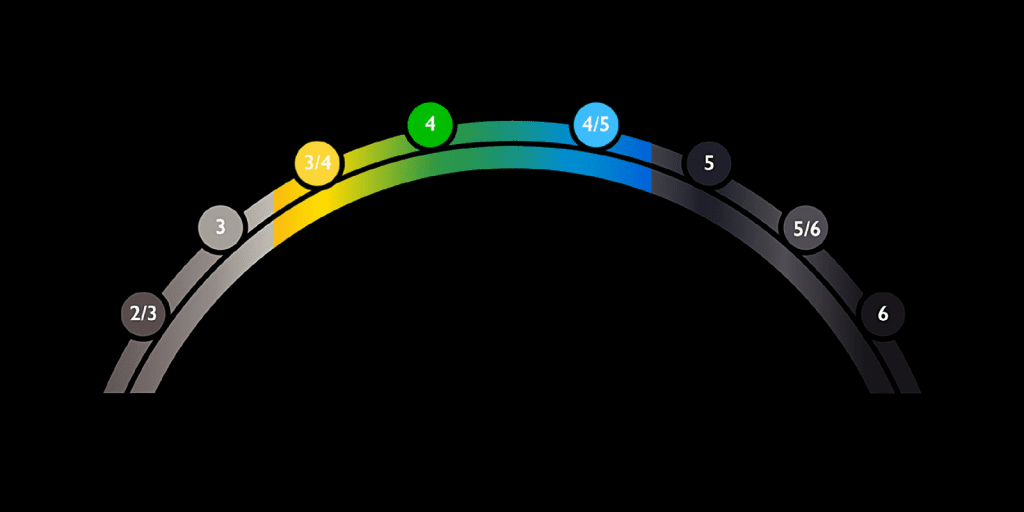
Humanity is Stuck in Development — Civilization’s Critical Evolution to the “Watershed Stage” in Ego Development Theory
This post assumes you’ve read the full EDT summary and is intended to dive deeper into a few specific stages of Ego Development Theory:
- Conventional Stage 3/4: Skill-Centric / Self-Conscious / Expert
- Conventional Stage 4: Self-Determining / Conscientious / Achiever
- Postconventional Stage 4/5: Self-Questioning / Individualist / Pluralist
First, let’s get a sense of the population breakdown at each stage:
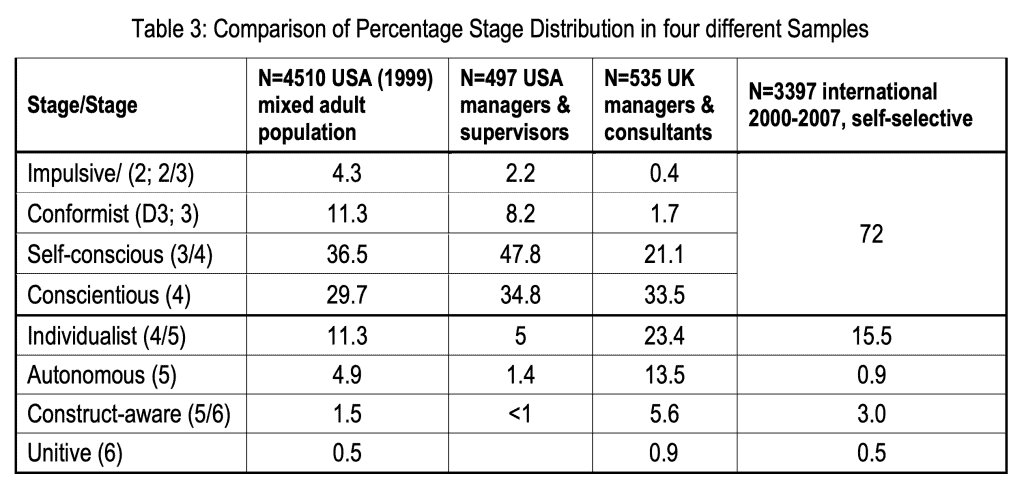
No matter how you slice and dice the numbers, the vast majority of people are in the conventional stages (3, 3/4, 4):
- USA: 78-91%
- UK: 56%
- International: ~70%
Of those in the conventional stages, the majority are in stages 3/4 and 4:
- USA: 66-83% (more people in stage 3/4)
- UK: 55% (more people in stage 4)
- International: Unspecified
Here are the big questions in my mind:
- Why are so many people stuck in the conventional stages of development (specifically stages 3/4 and 4)?
- What happens at the “watershed” between conventional stage 4 and postconventional stage 4/5?
- Is it possible to encourage and empower development from stage 3/4 to stage 4, and more importantly, from stage 4 to stage 4/5?
To attempt to make sense of these questions, the remainder of the post is a summary of the three stages and the major differences between the conventional and postconventional stages.
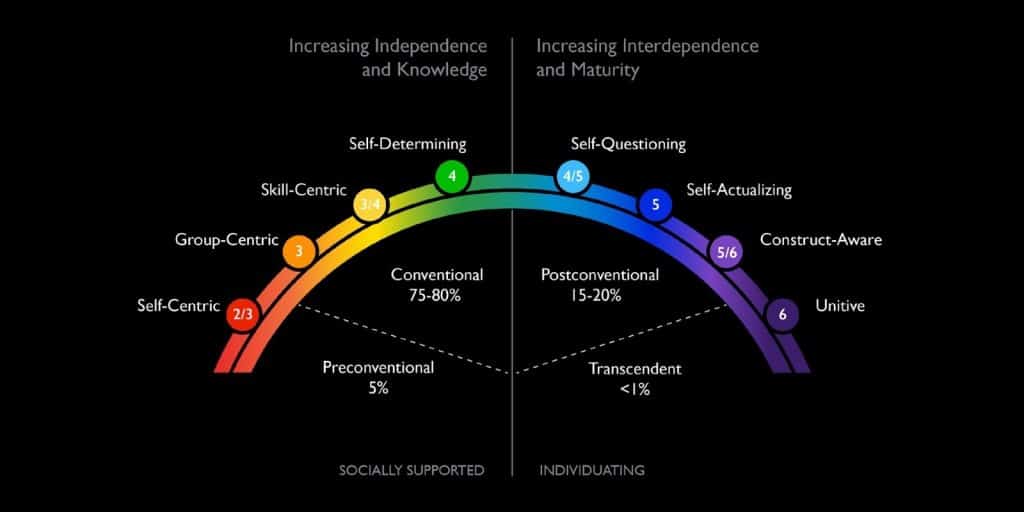
THE CONVENTIONAL STAGES (75-80% of population)
- “From the conventional Western perspective, the acquisition of this scientific, rational frame of mind is seen as the goal of socialization and schooling and defines what it means to be seen as a fully grown adult.”
- “The major limitation of the conventional mindset is its acceptance of facts and the external world as real and its blindness to the acquired nature of their beliefs. They accept the grand myth of conventional science that all problems can be solved with the appropriate technological inventions, if not yet, certainly in the future. Although complex scientific analysis is applied, the underlying assumptions of any system are rarely questioned or made explicit.”
Note: I’m skipping conventional stage 3 in this post since most of the population is in stages 3/4 and 4.
Stage 3/4: Skill-Centric / Self-Conscious / Expert (third person perspective — stage of differentiation)
Third Person Perspective:
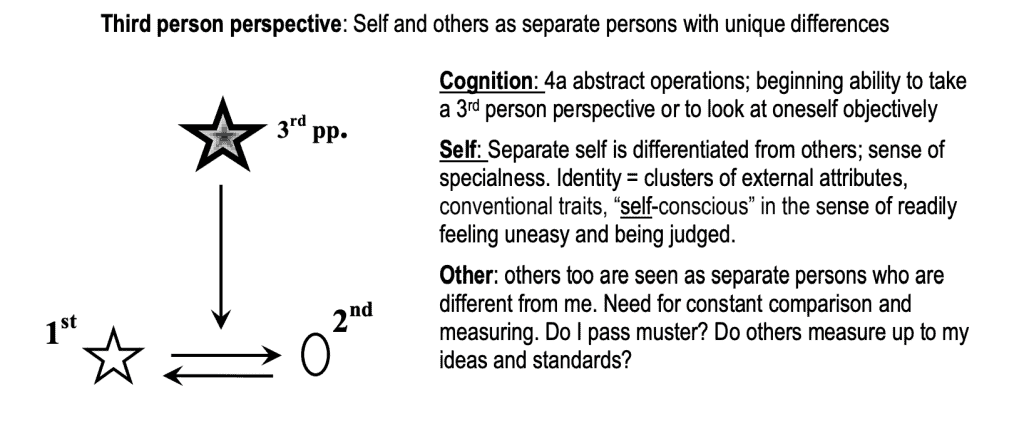
- Beginning introspection; now able to step back and look at themselves as objects from some distance for the first time; beginning ability to look at oneself objectively.
- Capable of abstract thought and operations; multiple views, permutations, and careful comparison among variables.
- Budding understanding of one’s life in linear time; begin to notice patterns.
- Beginning yet passive interest in causality; “I wonder why?”
Intrapersonal / Self:
- Begin to have access to some self-understanding; assert their own needs and wants (previously suppressed for the sake of being accepted); identity is clusters of external attributes and conventional traits; start to describe themselves with slightly more differentiated attributes (lonely, jealous, curious serious), norms (feminine), and conventional virtues (honest, patient).
- Drive towards separation and individuation; just recently discovered their own separate personhood; separate self is differentiated from others; sense of specialness; focus changes to individual differences away from fitting in; start to express their own personhood more often in contrast to others.
- Particularly prone to get their self-sense from identifying with their knowledge or expertise; identified with knowing the newest and most cutting edge products and procedures in their area of expertise; expertise/knowledge are ways to distinguish oneself.
- Concerned with fulfilling their adult responsibilities and duties and with doing things right; very adept at finding new and different solutions, better ideas, more perfect procedures, and greater efficiencies and doing things well; creating efficiencies, perfecting processes and steps to run things more smoothly.
Interpersonal / Others:
- Others are seen as separate persons with unique differences; start to reflect upon their own and others’ behavior; need for constant comparison and measuring; interested in discovering the kinds of behaviors that make them successful and respected; feel good when they are noticed and get the respect for what they know and can do.
- Often work hard to differentiate themselves from the immediate family context (from parents, siblings, and others doing similar things) and assert and express their newly discovered personhood; often leave the beliefs/values of their family behind.
- Still need a reference group that accepts and respects them; want to be accepted by others because of how they are different and special; feeling special can easily lead to feeling superior as one wants to stand out from the crowd.
- Clear-minded, pragmatic leadership style because they are unencumbered by fundamental questions and complexities; high moral standards; strong sense of what should be; “shoulds”/”oughts” are part of their way of making sense of life and of orienting themselves.
Blindspots, Limitations, & Fears:
- Super-ego is strong and not available for inspection; capacity to reflect on oneself is rudimentary as most energy is externally-focused.
- Sensitive/self-conscious when it comes to negative and critical feedback; readily feeling uneasy and being judged; criticism is experienced as a rebuke of the whole person because they are identified with what they do best and in what they believe.
- Swift with directing criticism towards others; it is the shortcomings, faults, and inadequacies of others that make life difficult; blaming and finding fault with others is a chief way to establish one’s sense of superiority and power; often blame the structure, the tools, or the incompetence of others for what is not working as it should; severe criticism of how another thinks is a common form of intellectual aggression; sense of superiority is not very well hidden and is activated by the smallest inadequacy in others; tend to evaluate others according to their own capabilities and standards.
- Often feel they have it all “figured it all out”; know all the answers; know what to believe; self-assured in their knowledge; know the truth, the best approach, the right way of doing something; rarely lost for an answer or an explanation; live in a world where things are sure and clear, and they feel very much entitled to impose their views on others; ultra-rational; intellectualize, rationalize and explain away what doesn’t fit their expectations or set beliefs.
- Do not yet realize that their perspective is only one among many possible ones; cannot yet conceive of the possibility that things could be done well in more than one way or that others could also do them adequately; lack of awareness that people differ and that their way may not work for everyone; enjoy oppositional battles with others who defend different positions; can seem argumentative and opinionated; discredit material or arguments that do not fit into their own schemes of how life works by dismissing counter-evidence or belittling others.
- Cannot yet prioritize among options or synthesize several possibilities; can’t see that not all solutions are of the same quality; can’t see the bigger picture and aims and thus can’t prioritize accordingly; focus more on doing things right/correctly vs doing the right things.
- Often difficult for others to work with; want to be single contributors and do not easily collaborate; often unskilled in collaboration and cross-disciplinary efforts.
- Fear losing sense of specialness; fear being reabsorbed and getting drawn back into the fold, into the mass of others; fear of incompleteness and vulnerability.
- Perfectionism can become their challenge; often display compulsive and perfectionist tendencies in their efforts to outdo themselves and to be a the top.
Why could so many be stuck at this stage?
- Finding your own voice and becoming your separate self identity as an adult is the most widely supported and rewarded movement especially in the modern West with its emphasis on agency and individualism. The transformation from being a part of a group identity to finding one’s separate identity and finding one’s voice is in many ways the task of healthy adolescent development.
Stage 4: Self-Determining / Conscientious / Achiever (expanded third person perspective — stage of integration)
Expanded Third Person Perspective:
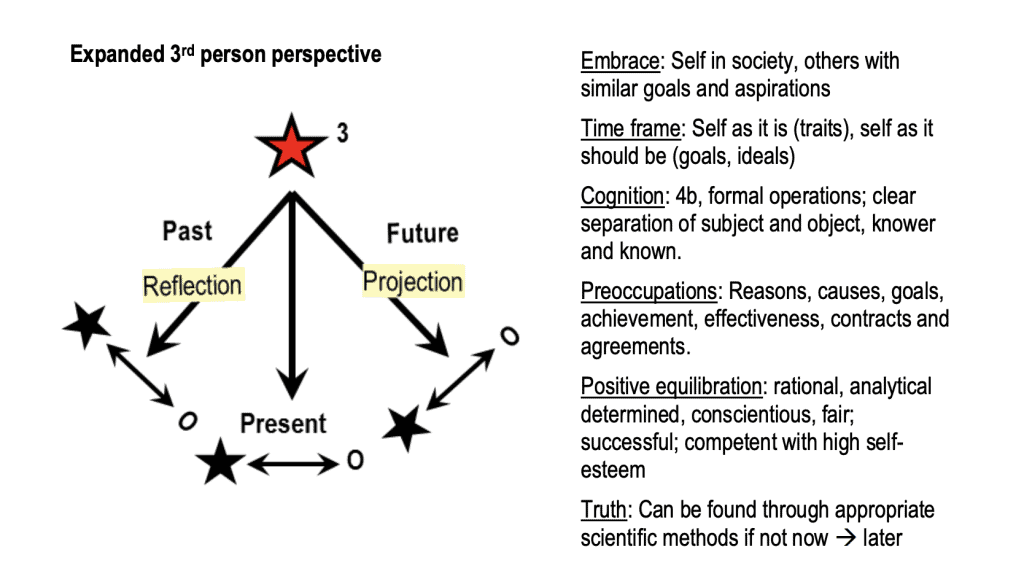
- Formal operational cognitive capacity and abstract rationality are at their peak (rationality, progressivism, positivism, and reductionism have their strongholds); can think in terms of logic and sequential order; rely on formal operations for their meaning making; clear separation of subject and object, knower and known.
- Linear view of reality; define objects (variables) as being separate and having closed boundaries; see causality as linear and variables are treated as independent; allows for variables to be separated and sorted around many criteria.
- Full awareness of linear time along with the need for broader relational social context; can look backwards and forwards in life; learn to understand themselves backwards and forwards in time, and describe past feelings, personal dreams and future goals; five to ten years backwards and forwards is now a regularly envisioned timeframe.
- More areas of experience are open to inspection; greater capacity to observe one’s motivations across different periods and in different actions: “Why do I do what I do?”; people have enough of a perspective on themselves as objects and on their life as changing over time to become truly introspective: “Do I live up to what I believe in?” is a serious life inquiry.
First stage where people grasp that they can continue to grow in mind and heart as adults. Stage of integration and re-embedding oneself in a larger cultural context, but now on ideological affinities and self-chosen criteria.
Intrapersonal / Self:
- Rationally competent and independent adults; concerned with reasons, causes, goals, consequences and the effective use of time; have places to go, personal goals to reach, and opportunities for self-knowledge/self-improvements; earnest conviction, seriousness, idealism and enthusiasm usually oriented towards action and external targets.
- Beginning to appreciate conceptual complexity as well as the nature of a closed system; can now notice contradictions and inconsistencies both within themselves and in the belief systems they adhere to; aware of contingencies and qualifications, and see alternatives to conventional responses to problem solving; synthesis and analytical weighing of different solutions; may see that the way a problem is framed is the problem; recognize and express conceptual complexity and explicitly refer to causal relationship, consequences and priorities; begin to describe themselves as complex psychological beings using differentiated psychological vocabulary; become familiar with their own preferred proclivities and defenses.
- Cherish self-knowledge and work at increasing it; personality tests, asking others for feedback, taking educational and professional courses and retreats as well as a new level of introspection lead to increasing self-knowledge; many reflect on themselves and express more differentiated feelings or can now identify with contradictory traits (“I’m an optimistic pessimist.”); appreciate the mutual expression of differentiated feelings and ideas; recognize that making new distinctions is an aspect of expanding one’s mind and internalizing new knowledge; become able to distinguish in much more subtle ways among different aspects of being a human being.
- Self-authoring; deliberately want to find out who they are and what they would like to become by consciously exploring past experiences and choices and thinking about the ideal future self; have gained a measure of independence and self-authorship that makes them feel they are the masters of their ships; captains of their own self-enterprise; believe that the truth about themselves can be found and are motivated to figure things out and to inquire.
- Drive for discovery; tend to ask lots of questions; not knowing or trying to figure things out is not an option; much of the world’s scientific progress is generated from this mindset; generally believe in the perfectibility of humankind and in the scientific method to “uncover” the laws of the universe; believe that the laws of the universe can be figured out eventually and proven; truth can be found if diligently pursued, if not now clearly over the long run; one can come closer to it by consistently applying the scientific method, by looking at things rationally, by continuously improving and refining one’s methods of inquiry and measuring tools; sometimes acknowledge that they stand on the shoulders of others (that is, if they don’t revel in their own selfhood and being self-made men and women).
- Able to prioritize among many tasks and steps in a process; rationality triumphs; interested in analysis; planful about their actions, concerned about priorities and consequence, and capable of revision and iterative assessment on as well as reorienting towards new goals; can now postpone exploration and put things on the back burner.
- Choose how to proceed based on their own critical examination of what works and what is important to know rather than relying on knowledge generated and received by the thought leaders in their area of interest; that extends to the conscious choice of what kinds of selves they want to be, what values they want to commit to and what purpose they want to enact in the world.
- Much energy goes towards reaching one’s goals and remaining independent; self-reliant, conscientious, and efficient and preoccupied with attaining goals and ideals; self-esteem depends on achieving their own set goals and lesser on external affirmation and approval.
- Open to continuous learning and self-improvement; trust in the potential to improve themselves through effort, learning and feedback; feedback can now be listened to without necessarily agreeing with it or feeling one’s whole identity has been diminished.
- Generally have positive self-regard based on their capacities and successes; sense of self-certainty common at this level comes from the notion that one can improve oneself.
- Societal values and morality are internalized if they fit self-evaluated standards and one’s personality; have internalized societal standards; want to live according to their own ideas and self-chosen values; if they do notice discrepancies between their values and behavior, they can learn to deal with tensions in more productive ways than before.
- Can be skeptical of conventional approaches; intellectual skepticism towards things that are not yet proven; one’s loyalty is to a chosen belief system or ideology rather than to the individual proponents of them.
- In love with the hypothetical, with theories at the espoused level; those whose proclivity is towards thinking may create complex theories of psychology or philosophy or dedicate themselves to research.
- Can include alternative life choices in reaction to what some perceive as the excessive focus on success at this level (“I don’t want to run in the rat race of success and money. I prefer to focus on family and a peaceful existence.”); alternative lifestyle choices are mostly a matter of individual preference; may be just as driven by a need to be in charge.
Interpersonal / Others:
- Embrace others with similar goals and aspirations (like-minded); tend to associate with people who have made similar choices about what they deem important to accomplish and the kinds of goals they therefore want to pursue and realize; join existing groups who share their ideals and aspirations; join together with others in order to achieve specific aims; can belong to diverse groups at the same time with different agendas and characteristics without feeling torn among them or getting confused regarding competing loyalties.
- Curious what makes themselves and others “tick”; explore causes of both their own and others’ behavior; concerned with motivation and reasons for behavior; analysis of others and self-analysis become a favorite pastime and challenge; motivation to classify and understand other human beings; interested in feelings, moods, traits, and motivations (“Why do I do that? What causes others to be what they are and to behave in certain ways? How can I use my knowledge of them, to help us achieve our goals? What do I need to know and do in order to get along? What can I learn as skills to become a better in conflict resolution or team management?”); knowing the root causes and reasons for unwanted behavior helps one to fix problems and to achieve better outcomes.
- Interpersonal relationships become intense and important; social contacts become increasingly diverse and rich; others are appreciated for having different expertise (as long as they don’t encroach upon my beliefs); others can now be valued for who they are independently of one’s own needs and wishes.
- Have a sense of responsibility and obligation towards others even while they pursue their own agendas and ideas; see themselves as indispensable and contributing members of the larger community or society, yet separate and responsible for their own choices; when they take responsibility to do something about a recognized problem, they can move with conviction.
- Function well in different teams and contexts concentrating on the task or problem to be tackled; realize that they need to cooperate with others in order to be successful and to get things done; can adjust behavior in order to fit in if necessary or take on a leadership position whichever is required; capable of balancing the need for effectiveness with a desire for efficiency (allowing them to delegate tasks to others).
- Committed to work towards the betterment of humanity according to what they consider an ideal future; convinced that society can be controlled and improved; convinced their particular approach is best for all; may have a driven quality to accomplish something or to improve the world (versus the need of later stages to develop oneself as an instrument of change); issues of legacy and making a lasting contribution are important to their self-image; see it as their role to make decisions with the best of intention to serve the greater good (can appear as a unilateral and overbearing need for control); when they are in charge, they feel empowered to make unilateral decisions in the perceived interest of all; will bend or break rules in order to change social structures and to serve the greater good or their need for freedom.
Blindspots, Limitations, & Fears:
- A more systemic view of reality is not yet visible; see themselves as independent wholes rather than also interdependent parts of multiple, overarching systems; tend to frame choices in contrasting either/or terms.
- High intelligence and access to cognitive complex thought can seduce individuals to overestimate their ego-development; creation of complex theories and learning about complex topics is done from an external point of view; knowing everything there is to know about a theory without transfer of the conceptions to their interior life; one can know all about a topic without ever integrating it into one’s own personal meaning making (EDT calls this external knowing about complex theories “aboutism”).
- Drive to succeed and achieve can readily lead to over-extension and exhaustion; find it difficult to acknowledge their limits of time and energy; hardly slow down to look at the present moment, to reflect upon life as a whole, or to give themselves a break; work-life balance issues are among the most common complaints.
- Chief defenses against doubt and criticism include intellectualization, rationalization, and suppression of shadow.
- Losing control is seen as a major threat to one’s well-being and self-identity (being in control is a very powerful aspect of this stage); knowledge, measurement and prediction are taken for granted as means to control nature, self and society; blind obedience and uncritical absorption of ideas is seen as “bad-me”; must make sure they are not pulled back, unconsciously subsumed in someone else’s scheme; fear of loss of progress, control, and clear boundaries are overcome with action and relentless forward moving.
- Urgent sense that time is fleeting; a scarce commodity one has to use effectively (“time is money”); often feel an urgency as time is ticking; preoccupied with getting things done with responsibility, conscientiousness and expediency; timeframe is often limited to a decade or two at best; the long-term view, the idea of having sown a seed which may or may not take root, is not yet enough.
- Can be very severe critics of themselves and fall into deep despair; tend to be self-critical, even hypercritical; exaggerated sense of being responsible for how things turn out may lead to feelings of guilt and inadequacy; guilt for having made the wrong choices and regret for having missed opportunities are central emotions; most often suffer depression in the form of guilt for not having fulfilled their goals and ideals, for the loss of a sense of being able to accomplish them, and the ongoing and deep fear of loss of control and autonomy.
- Not yet aware of developmental differences and may therefore demand behavior that is in over the other’s head; cannot yet truly fathom that there are people with earlier, more limited perspectives, and less choice and capacity that they have; believe that if others were more like them, the world would be a better place; tend to overestimate the level of control human beings have.
Why could so many be stuck at this stage?
- The expanded 3rd person perspective with its is widely considered the adult stage in much of Western culture; educational systems are geared towards producing adults with the mental capacity and emotional self-reliance of this stage; an independent, entrepreneurial, and self-reliant mindset is the financially most well-rewarded stage in the US and much of the West; society and institutions support and reward its achievement; achievement of long term personal goals as measured by inner standards is important as are the attaining of one’s ideals and values (These are often the ones currently most salient in the cultural surround. Thus, the money motive and the focus on individual success of many fit very well with a capitalistic and western outlook on reality.).
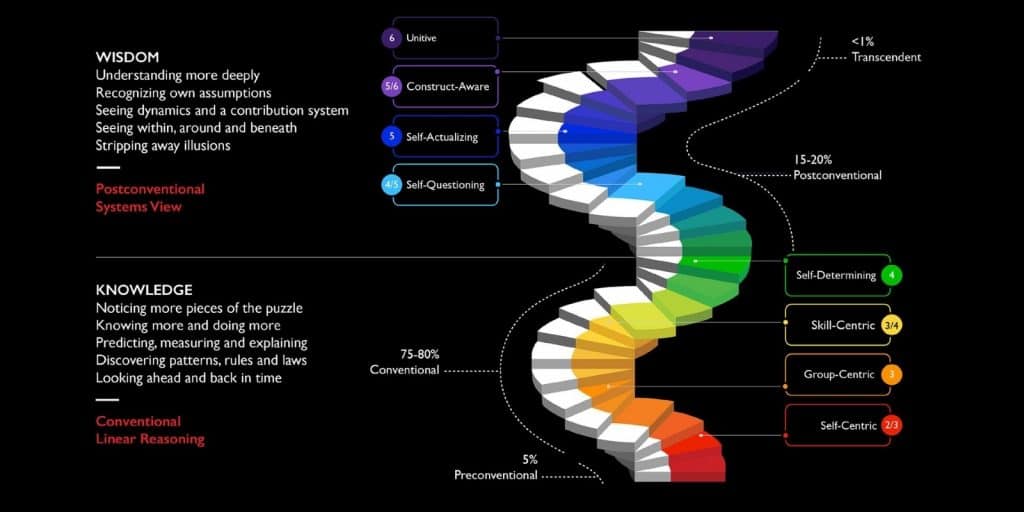
THE POSTCONVENTIONAL STAGES (15-20% of population)
The watershed:
- The transition to stage 4/5 is considered a major watershed in EDT as it signifies the move from conventional to postconventional meaning making—it is the first time that the vertical move and the questioning of previously unexamined ideas is no longer supported by society and its chief conventional representatives.
- At the first postconventional level adults come to realize that the meaning of things depends on one’s relative position in regard to them, that is, on one’s personal perspective and interpretation of them. Although the objects themselves are seen as permanent, their meaning is seen as context-dependent … It always depends on one’s definition of what is to be considered within a system or and what is outside. This view of reality is called the systems view because it allows individuals to look and compare whole systems of thought or organizations with increasing distance. Postconventional adults can become aware of their own unexamined beliefs. Interest in laying bare one’s underlying assumptions as well as those of the society is an important new capacity at these two new stages.
- The shift from conventional to postconventional stages also reflects a qualitative shift from a more linear, rational, intellectual to a more organismic and embodied awareness. In addition, this new way of perceiving can foster the realization that the whole (the Gestalt) is more than its separate parts. Therefore attempting to see the whole picture with its parts rather than merely parts and the details becomes an ever more important consideration with further vertical development.
- The attitude of certainty that permeates the conventional mindset changes dramatically with the move into the postconventional.
The first half of the journey vs the second half:
- The transition from conventional to postconventional meaning making also signifies an overall, large-scale shift from increasing differentiation and the creation of an independent self-identity towards increasing integration and deconstruction of the separation developed in the first half of the growth trajectory.
- The first half of the trajectory fosters the increasing separation from the newborn’s union with the mother towards the discrete, self-sustaining adult identity with clear boundaries, a self that is capable of making reasoned decisions, postpone gratification and pursue meaningful goals and purposes. It is this self-governing that is often viewed in the modern world as the fully developed “adult.”
- The second half of the trajectory represents a step-wise deconstruction of the sharp and artificially created boundaries towards an ever deeper identification with all that exists. The second half can also be likened to an ongoing individuation towards a more holistic, full-bodied, and integrated self that is fully aware of its interdependence with other systems and one that can take a perspective on its fundamental non-separateness. The postconventional stages show an overall trend of assimilation and integration towards an ever more conscious sense of unity with the ground.
Stage 4/5: Self-Questioning / Individualist / Pluralist (fourth person perspective – Stage of Differentiation)
Fourth Person Perspective:
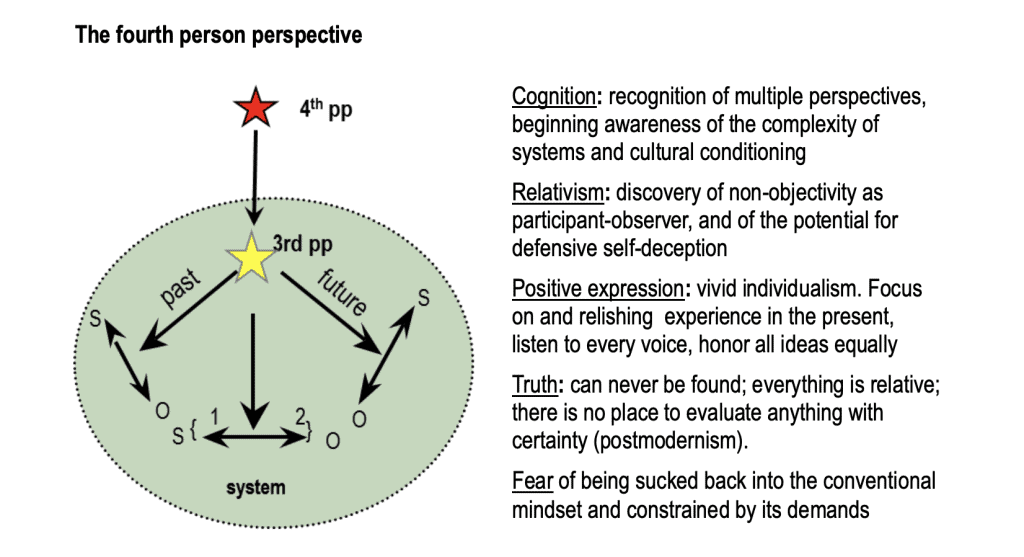
- Expands cognition to metasystematic operations; now able to integrate different frameworks of the self into a coherent new theory of who they are—a complex, coherent self-identity.
- Allows a focus on epistemology; examine how they came to believe what they believe and feel and how one knows and proves things; allows one to stand outside the system they grew up in and observe themselves and their cultural surround from a new altitude; can look at the familiar (status quo) through a new lens and query many of its tacit assumptions, values, and beliefs; rather than problems to solve, one must figure out what to define as “the” problem; many things that appear as problems can now be seen as polarities to be managed since most values come in pairs; can now entertain contradicting ideas and join them by “both/and” and “while”; more nuanced psychological vocabulary.
- Discovery of non-objectivity as participant-observer; one’s interpretation of reality/the world depends largely on one’s position as an observer; realize that things are not necessarily what they seemed at earlier stages; the idea of myself as a participant observer as well as having multiple perspectives becomes fascinating to explore; once we realize that as observers we inevitably influence what we observe, pure, detached, “objective” judgment becomes impossible; we cannot help but filter our observations through personal and subjective lenses; discover how subjective one’s perspective is and how much of what seemed objective is in the eye of the beholder; the same object has a different meaning for different observers; mature ones can integrate and bridge rational thought with non-linear approaches to getting information.
- Meaning making has shifted from an analytical-intellectual, purely rational analysis in favor of a more organismic, somatic and holistic mode of understanding in which feelings, body sensations and context are taken into account along with multiple perspectives and interpretations as well as the context; move from merely logical thinking to a more subtle, psycho-logical approach; the need to reason and to explain everything by rational means lessens; linear, intellectual logic gives way to a more holistic understanding of things; useful information can come from many sources that were previously considered outside the realm of scientific inquiry and viewed with skepticism, such as body sensations, intuition, dreams, reflection, and meditation; looking for connections and subtler clues to what is going on.
- Experience itself becomes the new attraction; the process (or journey) of discovery is now more intriguing than reaching a goal or creating a product; focus on and relishing experience in the present; deeply concerned with their interiors, with feelings and motivations; it is not always necessary to prove everything in order to embrace it; perception that sudden insights and breakthroughs are possible; playful exploration and imagination are set free; life is fresh and enticing.
Intrapersonal / Self:
- Beginning awareness of the complexity of systems and cultural conditioning; beginning greater cognitive complexity; realize that all groups and societies see it as their mandate to mold the minds and hearts of their members; we have far less control over being “molded” than we previously understood; socialization is relentless and ongoing from the day we enter the world—beginning with the earliest inculcation of what are considered desirable thoughts, feelings, values, and behavior and what is not—and continuing through schooling and reinforced at every moment via the media, commerce, and, most subtly, by the very nature of one’s native language and communication patterns; can now perceive how much their values and worldviews have been influenced by the environments into which they were born, in which they were raised, and in which they currently operate; can now look back at the previous belief system as a system; who we think we are depends on the historical context, geographic place, economic circumstances, education, the overall structure of the society, and many other factors that are part of shaping us; scientific certainty and the judgmental frame of mind break down when one fully realizes that most prior meaning making was socially and culturally conditioned.
- Become interested in watching themselves trying to make sense of themselves; begin to become aware of how easily we can fool ourselves about our motives and intentions; increasing awareness of one’s own vulnerabilities; can exhibit a new, non-hostile type of humor that is directed towards the self based on a beginning sense of the futility of framing things in terms of right and wrong, provable or disprovable.
- A big discovery for this stage is the relativity of points of view; beginning awareness of the nature of generalization; truth can never be found; everything is relative; there is no place to evaluate anything with certainty (postmodernism); when people first become aware of this, they may see everything as relative and reject any prior certainties including scientific knowledge as absolute and therefore “false”; it takes experience at this stage to realize that successful living likely requires some of the earlier values; can learn to consciously scrutinize their beliefs in order to test their assumptions or to relish the novel mental freedom such a maneuver opens up.
- Serious questioning of the underlying assumptions of the achievement mentality; turn away from the achievement-orientation and the external world towards inner experience; tend to distrust conventional wisdom and the hyper-rational tenets of the prior stage; at least initially, they may reject the prior mindset wholesale; may try to distance themselves from all that went before and reject the strive-drive values of the prior stage; reevaluate the soundness of the prefixed role identities that society offers and sanctions.
- Vivid individualism; must redefine themselves uniquely and independently of society’s givens based on their own experience, values, and conclusions; distinct emphasis and “need” for unique self-expression, a vivid sense of released energy and individuality.
Interpersonal / Others:
- Recognition of multiple perspectives; listen to every voice; honor all ideas equally; allow for the validity of others’ personal views and perspectives; can no longer disregard the enormous diversity of people and their beliefs, values and preferences; they are all seem equally valid and worthy of consideration.
The Individualist Expression of Stage 4/5:
- A major shift from prior stage’s preference for “doing” to focusing on “being and feeling”; newly focused with being and feeling rather than with doing and achieving; want to enjoy their own subjective experience, their unique way of making sense of things, rather than trying to analyze everything; it is all that can be trusted; attention turns from outcomes and deliverables to an interest in the processes, the relationships and the complex, non-linear influences among variables; need to understand and watch how things unfold; watch how they themselves and other people change and behave differently in different contexts.
- Become now-oriented instead of marching into the future; infuse experience in the present with importance; what can be trusted is one’s personal experience, sensations, thoughts and feelings in the here and now; the past is gone and the future cannot really be known; often replace the focus on causality (past) and goals (future) with a fascination with the immediate present; existential appreciation for how each moment differs from the next; the present is newly infused with salience and poignancy.
- New sense of body/mind connection and a beginning understanding of the interwoven, systemic nature of experience; begin to notice how feelings are diffused throughout the body; can come to realize how feelings, thoughts and body sensations affect each other.
- Often express hope and enthusiasm for their lives and their unique experience that others find inspiring; at the same time, they may be so idealistic and enamored with their discoveries, they ignore potential difficulties or downsides.
- Often concerned with making a unique and personal contribution to the world independent of any socially approved roles or tasks; part of the work as a postconventional adult is to discover what that unique purpose may be; can therefore become enthralled with watching themselves trying to make sense of themselves.
- Often withdraw from external affairs and company life or from ordinary daily routines; turn inwards in search of their unique gifts, meaning making, or answers to their own burning questions; if working independently, they are likely to fashion schedules and work contexts to optimize their flourishing; sometimes content to simply live day by day following “their own drummer”; often prefer to live at the fringe of society, to live exactly the way they want to be; admired for their spontaneity and unique self-expression.
- May or may not have a communal bend; if given room to be themselves and time to experiment freely they can provide valuable input to the workplace; find novel ways of looking at problems or inspire others with their enthusiasm in pursuing their own interests and questions; appreciate that others have their own unique ways of doing things and being themselves; recognize that different people have different needs and preferences; less apt to judge others; at times appear almost “amoral” in their demand to be who they are and do what they want.
The Pluralist Expression of Stage 4/5:
- Above all, an awareness of human diversity and multiple perspectives is the powerful and progressive contribution that this stage has brought to human affairs; egalitarian emphasis is an important step towards further differentiation and integration; tend to focus on the multiplicity of voices and contexts; aware of their own views as interpretations and do not want to impose these on others; seek instead to respect and understand all positions; individual differences are celebrated and paid attention to in a way that the prior stage cannot yet appreciate; the very differences become the center of attention now rather than being bracketed out in order to “manage” the differences in order to reach an agreed upon goal; each person’s view is considered equally genuine and valid from their own point of view as well as a crucial aspect of the overall diversity in the room.
- Heightened capacity to contact the self and to introspect leads to a greater capacity to empathize with others and to tolerate different ideas, behaviors and reactions; often admired by others for their unconcerned, energetic self-expression, their spontaneity, and their ability to live a life according to their own unique style free from restrictive conventions; relationships with others are intense and mutually rewarding when there is synergy and choice; can be powerful advocates for tolerance and equality, but also get hung up in endless discussions and over-privileging diversity to the neglect of our common humanity.
- A special case of pluralism is the academic discipline of deconstructive postmodernism; believes that it is impossible to defend any belief by proclaiming that all views are subjective and therefore legitimate since everything is relative; when relativism is carried to its logical extreme no view or interpretation is better than any other; all are equal; postmodernists believe that any meta-narrative succumbs to the same subjective arbitrariness; they deny the legitimacy of all hierarchies and all hierarchical ordering; may be hypersensitive to perceived instances of judgment as “better” or “valuable” in human terms; in the extreme case, postmodernists assert with absolute certainty that there is no position from which to judge anything; do not yet recognize the inherent self-contradiction in their assertion.
Blindspots, Limitations, & Fears:
- The possibility of defensive self-deception and culturally-biased distortion are now starting to be experienced as ever-present dangers.
- The prevalent anxiety is around integrating different parts of oneself; inner conflict and despair about ever finding one’s true self; while some relish inconsistencies as proof of the illogical nature of conventional beliefs, others at this stage may become confused by observing the many contradictions; often describe themselves as having subpersonalities, many voices, or as an “inner tribe”; these voices cannot be readily synthesized into a coherent self-identity; concern that one will never find a clear self-definition from which to consistently operate and generate a coherent self sense.
- Fear of being sucked back into the conventional mindset and constrained by its demands; realistic fear of being reabsorbed into the “rat race” of the prior stage’s mindset by the demands of society; dread of a routine work life that does rarely allows for individual self-expression and creativity.
- Deep experience of worry and tensions that come from growing beyond the conventional mindset especially when it comes to intimate relationships; the experience of looking at the world with different eyes than those that used to be one’s closest allies, such as a spouse or a long-term friend, can create great distress for both parties; while the conventional partner is confused about the new way of behaving of the person with the 4th person perspective, those who are postconventional feel misunderstood and un-appreciated for what they now feel they have to offer; the latter also often wish for the significant other to become more like themselves; this, in turn, can make the person “left behind” feel disrespected and misunderstood; in this sense, the move of one partner from conventional to postconventional meaning making poses a particular challenge to couples and long-term relationships.
- The move from being unconsciously embedded in a cultural surround to having a perspective on it can be both liberating and confusing. Liberating: now even more able to explore and recognize own unique way of being a human being with new choices and more capacity to understand many fascinating aspects of the world; may enjoy paradoxes and contradictions and no longer try to explain them away. Confusing: now there are unlimited ways of perceiving the world without any one view better than another. The same object/event can have different meanings for different observers, for the same observer in different contexts or at different times.
- (Individualist Expression) When there’s over-focus on their inner world and the experience of having multiple—often seemingly incompatible—selves they may express frustration with development and ever expanding self-knowledge; the more one explores, the more confused one may get; when the overriding feeling becomes “everything is relative,” and “there is nothing to hold on to,” cynicism and nihilism can become a way to defend against the feeling of being adrift on a vast unknown sea unmoored and rudderless.
- (Pluralist Expression) The tendency to treat every opinion with the same regard can be driven to an extreme; in societies, organizations or teams where everybody’s voice is given equal opportunity for expression, meetings can run on forever and little gets resolved or accomplished; the over-focus on fairness and voice, can lead to “decision paralysis” as no one dares to take a lead role, assert a position, or make an executive decision for fear to be seen as unilateral, uncooperative, or oppressive; one of the more problematic attributes of many proponents of radical pluralism that they judge all hierarchies as oppressive; cannot recognize that decision paralysis is its own form of oppression and constraint.
- (Pluralist Expression) When they have to manage others as part of a job, they can be autocratic or idiosyncratic to such a degree that others find them “impossible to nail down,” “aloof and unapproachable,” or simply “wishy-washy”; one never knows where one stands with such a leader; may be feared as unpredictable or dismissed as dreamers and non-doers, especially in an strive-drive context.
For more about Ego Development Theory, including all the other stages, see this post:
You May Also Enjoy:




